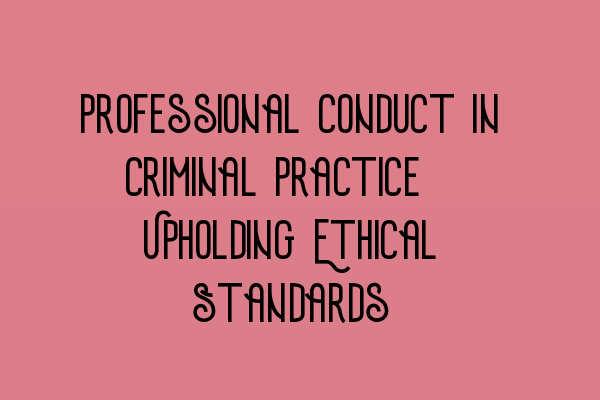Professional Conduct in Criminal Practice: Upholding Ethical Standards
As a solicitor in the field of criminal law and practice, it is of utmost importance to uphold ethical standards and maintain a high level of professional conduct. The nature of criminal practice requires adherence to strict ethical guidelines to ensure fair and just proceedings. In this article, we will explore the key aspects of professional conduct and discuss the significance of upholding ethical standards in criminal law.
Importance of Professional Conduct
Professional conduct plays a vital role in maintaining the integrity of the criminal justice system. Solicitors are entrusted with the responsibility of representing their clients to the best of their abilities while also ensuring that justice is served. Upholding ethical standards enhances the confidence of the public in the legal profession and contributes to a fair and transparent judicial process.
Now, let’s delve into the key principles of professional conduct in criminal practice:
Confidentiality
Confidentiality is an essential aspect of professional conduct in criminal practice. Solicitors have a duty to keep all information shared by their clients confidential, unless there is a legal obligation to disclose. Breaching confidentiality can undermine the trust between the solicitor and client and may have serious ramifications for the client’s defense.
It is crucial for solicitors to maintain strict confidentiality even after the completion of a case. This professional ethics protects the interests of both the client and the profession as a whole.
Conflicts of Interest
Another fundamental principle of professional conduct is the avoidance of conflicts of interest. Solicitors must act impartially and avoid any situation that might compromise their ability to provide objective advice or representation. This includes refraining from representing clients with conflicting interests or participating in cases where personal relationships could impede professional judgment.
Identifying potential conflicts of interest is crucial at the outset of a case to ensure ethical obligations are met. Failure to do so may lead to serious repercussions and pose a threat to the reputation of the solicitor and the legal profession at large.
Competence and Diligence
Professional competence and diligence are essential in criminal practice. A solicitor must possess the necessary knowledge, skills, and resources to provide competent legal representation. Staying up-to-date with legal developments, precedents, and changes in legislation is paramount to delivering high-quality services to clients.
Solicitors must also exercise due diligence in handling their clients’ cases. This includes thorough research, rigorous preparation, and meeting deadlines to ensure that all proceedings are conducted efficiently and effectively.
Respecting the Rule of Law
Respecting the rule of law is a fundamental aspect of professional conduct in criminal practice. Solicitors must always act within the boundaries of the law and ensure that their clients do the same. This involves advising clients on the legal implications of their actions, advocating for adherence to legal processes, and upholding the principles of justice.
By maintaining a commitment to the rule of law, solicitors contribute to the fairness and integrity of the criminal justice system, as well as protect the reputation and credibility of the legal profession.
Continual Professional Development
Professional conduct does not stop at the mere adherence to ethical standards. It also involves a commitment to continual professional development (CPD). Staying informed about the latest legal developments, attending relevant training courses, and actively engaging in professional organizations are essential for solicitors to enhance their skills and knowledge.
For SQE 1 Practice Exam Questions, check out this resource.
Prepare yourself for the SQE 1 examination by practicing with mock exams. Try these SQE 1 Practice Mocks FLK1 and FLK2.
Are you looking for SQE 2 preparation courses? Visit our SQE 2 Preparation Courses page for more information.
Gain the knowledge and skills necessary for SQE 1 with our comprehensive SQE 1 Preparation Courses.
Conclusion
Professional conduct and upholding ethical standards are integral to a successful career as a criminal law solicitor. By maintaining confidentiality, avoiding conflicts of interest, demonstrating competence and diligence, and respecting the rule of law, solicitors contribute to a fair and just criminal justice system.
Continual professional development is also crucial for solicitors to enhance their skills and stay abreast of legal developments.
For the latest SRA SQE Exam Dates, click here: SRA SQE Exam Dates.
Armed with a strong commitment to professional conduct, solicitors in criminal practice can serve their clients and the legal profession with integrity and credibility.
